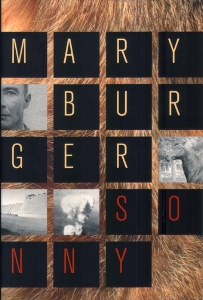Sonny
Novella. An elusive narrator uses the Trinity atomic bomb test as the backdrop and metaphor to portray a family’s turbulent changes.
Leon Works, 2005
"In the space of relation, Mary Burger offers a new kind of writing—a testimony that cannot be defended or deflected. Sonny, a series of speech acts, a hypnotic set of patterned particulars, constructs with the awareness that language 'demands that we should see what's there and what is possible'. This work of innovative prose forms and reforms itself into a history that remembers, that recalls and that echoes the desire of the narrator to 'replace the story with itself'."
—Renee Gladman
Sonny (excerpt)
This boy raised rabbits and kept them in cardboard pens in the yard.
He showed the rabbits at the fair. He sold the rabbits for pets, or for fur, or for food.
———————————
Once when it snowed very hard the boy had to climb on the roof of the house and push the snow off with a broom.
His sisters looked out through the glass front door.
———————————
What this boy liked best about representation was the way it consoled him for being alive.
What this boy liked best about being alive was the way it consoled him for the immateriality of representation.
———————————
But this was something new—
something out of all proportion—
Once it was dangerous to know that you were not the center. Then the knowledge put us at the center once again. What other creature knew the world that way? We outlasted our own credibility.
We broke our world apart and started over, broke it and rebuilt it in a different form. Now we were teaching nature to remake itself. An abstract version of a civic form. If there was no creation or destruction, what we valued was what we used to build the form.
We looked for one event that would begin or end, a single mark that everything was organized around.
The climax turning unextraordinary when it repeats. So the haze of arousal, undistinguished, punctuated repeatedly
blue, gray, orange.
It was the moment of implosion that we lived for but the aftermath that made it interesting.
